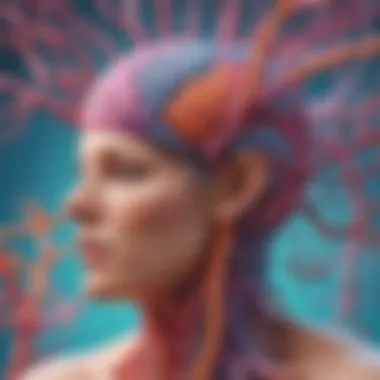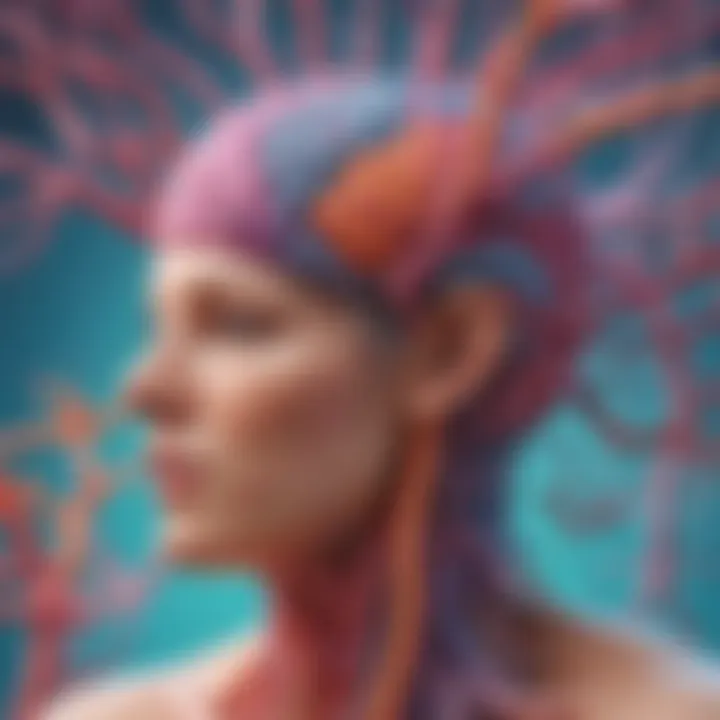Understanding Brain Health: Insights from 'Brain Maker'


Intro
In a world where multitasking is the name of the game, we often overlook the connection between our gut and our brain. This connection is fundamental, as highlighted in 'Brain Maker' by David Perlmutter. The book provides a deep dive into how gut health impacts cognitive functions, mental clarity, and overall well-being. This article will take a closer look at the essential elements discussed within the text, emphasizing the interplay of nutrition, gut microbiota, and cognitive performance while shedding light on the practical implications for our daily lives.
Categories of Life-Changing Books
Books that offer transformation often fall into different categories. Identifying whether you seek self-improvement, knowledge, or personal growth can shape your reading journey.
Self-Help and Personal Development
In the realm of self-help, 'Brain Maker' stands as a beacon, guiding readers through the challenging landscape of mental wellness. The insights provided in the book are not just theoretical but rooted in scientific research, illustrating how the food we consume relates directly to how we think and feel. By prioritizing gut health, individuals can take actionable steps toward improving their mental clarity and emotional stability.
Key aspects of self-help offered by 'Brain Maker':
- Understanding Gut-Brain Axis: Recognizing the bi-directional communication between the gut and brain.
- Nutritional Choices: Making informed dietary selections to nurture brain health.
- Microbiome Influence: How bacteria in our gut can impact mood and cognitive function.
Fiction with Transformative Themes
While 'Brain Maker' is non-fiction, its themes echo literary elements found in transformative fiction. Stories that explore personal transformations often mirror the insights gleaned from scientific texts. They reveal deep emotional connections and timeless truths. Such narratives can inspire individuals to rethink their habits and choices, much like the research discussed in 'Brain Maker'.
Book Summaries and Insights
Analyzing books like 'Brain Maker' equips readers with practical wisdom that can be woven into daily routines.
Key Takeaways from Popular Titles
While the focus is on 'Brain Maker', a glance at other similar titles sheds light on a growing interest in the gut-brain relationship.
- The Gut Health Protocol by John C. Brisson—Focuses on diet and supplements that support gut microbiome.
- The Mind-Gut Connection by Emeran Mayer—Explores the neurological and psychological aspects of gut health.
- Brain Food by Lisa Mosconi—Emphasizes nutrients crucial for optimal brain performance.
How to Apply Insights in Daily Life
Now that we have explored the key takeaways, translating these into action is vital for personal growth. Here are some ways to integrate the insights from 'Brain Maker' into everyday life:
- Focus on Probiotics: Incorporate fermented foods like yogurt, kimchi, and kombucha to enrich gut flora.
- Diversify Your Diet: A wider variety of vegetables can support microbiome health. Think of colorful options to fill your plate.
- Stay Hydrated: Drinking water can help maintain the mucosal lining of the intestines and promote the overall health.
"The food you eat can influence not only your body but also your mood and mind, creating a ripple effect on your life experiences."
As we weave through the insights presented in 'Brain Maker', we uncover the intricate links that exist between our lifestyle choices and the profound effects on our brain's health. The world of nutrition is not merely about avoiding bad food; it's about making thoughtful choices geared towards vibrancy. The exploration continues as we synthesize these valuable insights into actionable steps that foster a healthier, more well-rounded life.
Prologue to 'Brain Maker'
In recent years, the spotlight has shifted onto the intricate relationship between our gut health and our mental wellbeing. This correlation is pivotal, and it is this foundation upon which the book Brain Maker builds its premise. Understanding how the gut microbiome influences brain function provides rich insights into the very essence of ourselves. Apart from the scientific data, the discussion surrounding gut health and cognition urges us to reflect on our lifestyle choices—choices many take for granted.
When we dive into Brain Maker, we encounter compelling arguments that encourage us to reevaluate not only what we eat but how we think about food and its interrelation with our overall cognitive health. This exploration is not just an academic exercise; it’s a clarion call for individuals seeking to enhance their mental clarity and emotional balance through deliberate nutritional and lifestyle adjustments.
"The gut is often referred to as the 'second brain' because of its profound effects on mood, emotion, and even cognition."
Many of us gloss over the significance of our gut microbiota, but this book brings that importance to the forefront. As we move forward in this article, we will unpack the critical discussions around who authored this work, the fundamental theories presented, and how these concepts translate into practical applications for daily living.
Author Background and Expertise
David Perlmutter, the author of Brain Maker, is a neurologist with an impressive pedigree. His expertise lies at the intersection of neurology and nutrition, making him uniquely qualified to discuss the impacts of diet on brain health. Perlmutter's background features notable mentions in both clinical practice and research, illuminating how lifestyle can influence neurological conditions. His knack for simplifying complex ideas into digestible information has resonated with a wide audience, empowering readers to take charge of their mental health.
Throughout his career, Perlmutter has ventured beyond traditional medicine. His approach blends scientific inquiry with practical advice, making Brain Maker not merely a collection of research but a practical guide for everyday life. Readers can gain insights that are not merely theoretical; they’re grounded in scientific exploration and reflection.
Overview of Core Concepts
At the heart of Brain Maker are several core concepts that bridge the gap between diet and brain functionality. The book delves into topics such as:
- Gut Microbiome: The community of microorganisms residing in our gut plays a substantial role in determining not just digestion but overall health—this means everything from immunity to mental wellness.
- Neurotransmitter Production: The book particularly emphasizes serotonin and dopamine, which are significantly influenced by the gut flora. Alterations in gut health can lead to fluctuations in mood and cognitive function.
- Dietary Patterns: Perlmutter encourages readers to embrace a balanced diet, rich in whole, unprocessed foods, and probiotics that favor mental health. The link between healthy eating and mental clarity is underscored throughout.
The narrative in Brain Maker is compelling and challenges the reader to actively consider how their daily choices can cultivate a healthier brain. Instead of hypothetical musings, it's a push towards tangible actions with the potential for life-altering effects.


The Link Between Gut Health and Brain Function
The intricate connection between gut health and brain function is not just a passing trend; it’s a captivating area of research that highlights how our intestinal flora can shape our cognitive capabilities. Recent studies spotlight the role of the gut microbiome in affecting everything from mood disorders to cognitive decline, fundamentally changing the way we understand brain health. By recognizing this link, we open doors to new strategies for improving mental clarity through nutritional and lifestyle interventions, which are pivotal themes in 'Brain Maker'.
Understanding the Microbiome
The microbiome is a bustling ecosystem of trillions of microorganisms, including bacteria, viruses, and fungi, residing within our intestines. This microscopic community does much more than simply aid in digestion; it plays an essential role in immune function, metabolism, and even mental health.
To put it simply, if the gut is the garden of our body, the microbiome is the diverse array of plants that can either nourish or choke the very soil they inhabit. One concept that quickly rises to the forefront is how a balanced and diverse microbiome supports neurotransmitter production. For instance, about 90% of serotonin, a key neurotransmitter influencing mood, is produced in the gut. This fact alone underscores the importance of maintaining gut health to bolster emotional well-being and cognitive function.
It's also worth noting how external factors like diet, stress, and sleep can dramatically alter this delicate balance within the microbiome. These influences can lead to dysbiosis, a condition where harmful bacteria overshadow beneficial ones, shifting the scales toward inflammation and impaired neurological health. Thus, understanding the microbiome entails a holistic view of internal and external conditions affecting it.
How Gut Flora Affects Mood
The term "gut-brain axis" has become a buzzword lately, capturing the idea of communication between the gut and the brain. It's an intricate dialogue, one that can pivot our mood from joy to despair, and significant scientific exploration is underway to decipher this nexus. When gut flora thrives, it releases bioactive compounds that send positive signals to the brain. Conversely, an imbalance can lead to negative emotions and cognitive fog.
Research lays bare the impact of probiotics and prebiotics—a natural way to add beneficial bacteria to the gut. Foods like yogurt, kefir, and sauerkraut are hailed for their gut-friendly properties, but the benefits extend far beyond the digestive tract. Some studies suggest that regular consumption of these foods can reduce anxiety and depressive symptoms.
Moreover, chronic conditions stemming from gut imbalances, such as irritable bowel syndrome, are often intertwined with anxiety and mood disorders. The brain and gut continuously send signals to each other, creating a feedback loop that can either help or hinder mental health.
"The gut microbiome could be viewed as the orchestra, with the gut-brain axis acting as the conductor, shaping the way emotional and cognitive symphonies are performed."
The relationship between gut flora and mood pinpoints a crucial element of preventive health care. By focusing on nurturing the gut biology through balanced nutrition and lifestyle adjustments, individuals can vastly improve their overall mental health landscape. Incorporating more fiber-rich foods can positively shift gut health, leading not only to better digestion but also to enhanced mental resilience.
In essence, what we consume can either be the key that unlocks cognitive potential or a chain that weighs down our intellect. The narrative explored in 'Brain Maker' offers profound insights into cultivating better mental health through an understanding of our gut. By making informed choices about gut health, one can pave the way for clearer, more focused cognitive function.
Nutrition's Role in Cognitive Development
Nutrition plays a pivotal role in shaping the brain's capacity to function optimally. Just like a high-performance vehicle needs premium fuel, our brain relies on the right nutrients to perform at its best. The relationship between nutrition and cognitive development is multifaceted, influencing everything from memory to emotional regulation.
Adequate nutrition is not just about satisfying hunger; it directly affects the brain's structure and function. A well-rounded diet provides essential building blocks that are crucial for neurotransmitter synthesis, myelination, and the overall maintenance of brain cells. Each nutrient has a unique function, and a deficiency in any of these can lead to noticeable deficits in cognitive abilities.
Essential Nutrients for Brain Health
A variety of nutrients are vital for maintaining strong brain health. Here’s a deeper look into a few standouts:
- Omega-3 Fatty Acids: Found in fish like salmon and in flaxseed, omega-3 fatty acids are linked to improved brain structure. They aid in neurogenesis—the creation of new neurons—and are vital for synaptic plasticity, allowing for better learning and memory.
- Antioxidants: Vitamins C and E, found in fruits and nuts, combat oxidative stress in the brain, protecting neurons from damage. This protection helps maintain cognitive function as we age.
- B Vitamins: These are critical for energy metabolism in the brain. Deficiencies in vitamins like B6, B12, and folate can lead to impaired cognitive function and an increased risk of mental decline.
- Choline: This nutrient, commonly found in eggs, is essential for the development of brain cells and neurotransmitters. It's particularly crucial during pregnancy and infancy for cognitive development.
This is only scratching the surface, but these nutrients are among the most influential in promoting overall brain health and cognitive functionality.
Dietary Patterns and Their Implications
The effects of dietary patterns on brain health cannot be overstated. A balanced diet, often likened to a symphony where each instrument contributes to the whole, is needed for optimal cognitive performance. Conversely, diets high in processed foods can disrupt normal brain function.
- Mediterranean Diet: A diet rich in fruits, vegetables, whole grains, and healthy fats has been shown to be beneficial for cognitive health. This pattern supports not just physical health but also emotional well-being.
- High Sugar Diet: Excessive sugar—think sugary drinks or candies—can lead to inflammation in the brain, which has been associated with poor cognitive performance.
The implications of one’s dietary choices extend beyond just physical health; they deeply impact mood regulation, memory retention, and even decision-making skills.
"Let food be thy medicine and medicine be thy food." - Hippocrates
The Science Behind Neurotransmitters
Neurotransmitters are vital messengers in the brain that help regulate a wide array of functions, from emotions to cognitive processes. Understanding their role is essential for grasping how our moods and thoughts can be influenced by both our diet and our gut health, a central theme explored in Brain Maker. This exploration sheds light on how neurotransmitters not only affect our mental state but also how they can be impacted by the health of our gut flora.
Role of Neurotransmitters in Mood Regulation
Neurotransmitters like serotonin and dopamine often steal the limelight when it comes to discussions about mood regulation. They play crucial roles in determining how we feel and react to the world around us. For instance, serotonin is commonly dubbed the "feel-good" neurotransmitter, mostly because higher levels are correlated with feelings of happiness and well-being. Conversely, low serotonin levels can lead to mood disorders such as depression and anxiety.
Using neurotransmitters effectively is like tuning a musical instrument; when everything is in harmony, the beautiful music of a balanced mood emerges. Here are the pivotal roles some key neurotransmitters play:
- Serotonin: Often associated with happiness, it regulates mood, appetite, and sleep. Inadequate levels can result in depression and anxiety.
- Dopamine: Linked to pleasure and reward, it influences motivation and emotional responses. A deficit may lead to feelings of apathy or lack of enjoyment.
- Gamma-Aminobutyric Acid (GABA): This neurotransmitter acts as a natural tranquilizer, helping to reduce anxiety and stress levels.
The delicate balance of these neurotransmitters underscores why maintaining gut health is crucial—gut bacteria can actually influence levels of these neurotransmitters. When gut flora is in tip-top shape, it helps facilitate the production of these key brain chemicals, highlighting a remarkable connection between our gut and mood regulation.


Impact of Gut Microbiota on Neurotransmitter Levels
In the complex dance of the gut-brain axis, gut microbiota plays a pivotal role in determining the levels of neurotransmitters in the brain. Research indicates that certain gut bacteria can produce neurotransmitters themselves or influence their synthesis. This opens a fascinating window into how diet could directly shape our mental health through the gut microbiome. The connection can be summed up as follows:
- Bacteria like Lactobacillus and Bifidobacteria are known to produce GABA, showcasing a direct link between gut health and anxiety management.
- Short-chain fatty acids generated from fiber fermentation by gut bacteria can enhance serotonin production. This reveals how dietary choices can influence serotonin levels positively.
- Imbalanced gut flora may lead to dysregulation of neurotransmitter pathways, potentially resulting in mood swings and emotional disturbances.
To put it simply, our gut health acts as a controlling factor over our brain's neurotransmitter levels. Healthy gut flora contributes significantly to balanced neurotransmitter production, which in turn supports better mood regulation.
"The state of your gut can affect everything from depression to anxiety, showing just how intertwined our physical health is with our mental landscape."
Maintaining a diet rich in prebiotics and probiotics can foster this beneficial microbial environment, ultimately influencing our mental well-being. As researched in Brain Maker, the essence of brain health is reflected in our dietary choices, reinforcing the interconnectedness of body and mind.
Challenges in Modern Diets
Understanding the challenges in modern diets is crucial in the context of 'Brain Maker', as it highlights how daily food choices impact not just physical health, but mental acuity as well. As lifestyles become busier and convenience reigns, many individuals opt for fast meals that favor speed over nutritional value. This shift often leads to numerous complications like weight gain, poor digestion, and, most importantly, an unbalanced microbiome, which can take a toll on brain health.
In a world overflowing with choices, it’s easy to overlook the importance of wholesome, nourishing foods. Integrating these into one’s diet can rekindle a balance that modern living has disrupted.
Processed Foods and Their Effects
Processed foods have become staples in many households, often due to their affordability and accessibility. However, they often come with hidden costs—namely, higher levels of sugar, salt, and unhealthy fats. Nutrient dilution is a significant drawback of these options. For instance, a typical processed meal may lack essential vitamins and minerals, as the food processing methods strip away naturally occurring nutrients. Here are some common effects of a diet high in processed foods:
- Weight Gain: High levels of refined sugars and carbohydrates contribute to increased calorie consumption, leading to obesity.
- Mood Swings: Fluctuating blood sugar levels can affect mood stability, leading to irritability and anxiety.
- Cognitive Decline: There's growing evidence to suggest that diets high in processed foods can detrimentally impact cognitive function over time.
"You are what you eat", they say, and that's more than a catchy phrase—what we ingest directly influences our mental clarity and overall well-being.
Create an Unbalanced Microbiome
The modern diet is heavily laden with elements that can disrupt gut flora. A thriving microbiome, which consists of trillions of bacteria, is essential for optimal health. However, unbalanced diets that favor sugar-heavy and processed foods can lead to dysbiosis, a term that refers to the imbalance in gut bacteria. This imbalance can precipitate a range of issues, such as:
- Digestive Problems: Symptoms like bloating, gas, and irregular bowel movements can arise when the gut flora is disrupted.
- Mental Health Issues: Emerging research indicates a strong correlation between a healthy gut and positive mental health, with dysbiosis linked to anxiety and depression.
- Increased Inflammation: An unbalanced microbiome can trigger systemic inflammation, further complicating mental and physical health challenges.
Practical Applications from 'Brain Maker'
The relevance of practical applications drawn from 'Brain Maker' cannot be overstated. This topic serves as a bridge between the theoretical knowledge of gut-brain connections and the real-world benefits that can stem from understanding and applying these insights. By putting theory into practice, individuals stand to gain considerable improvements not just in their cognitive function, but also in overall mental health. Emphasizing actionable steps, this section explores both dietary changes and lifestyle adjustments that can effectively enhance brain performance.
Implementing Dietary Changes
Implementing dietary changes is not just about swapping out a few ingredients. It’s a deep dive into reassessing one’s relationship with food, understanding how what we consume can alter gut microbiota, and thereby influence brain health.
- Prioritize Whole Foods: Focusing on natural, unprocessed foods nourishes the microbiome. Think of it this way: Your gut is a garden, and whole foods are the seeds that will help it flourish.
- Probiotics and Fermented Foods: Incorporating items like yogurt, kimchi, and sauerkraut can help populate the gut with beneficial bacteria. It’s akin to adding fertilizer to that garden—essential for growth!
- Omega-3 Fatty Acids: Found in fatty fish like salmon and walnuts, these are crucial for keeping neural pathways clear. Just like oil keeps machines running smoothly, Omega-3s ensure your brain functions at its best.
- Avoiding Sugar and Processed Foods: This is where the rubber meets the road. Excessive sugar and processed items can wreak havoc on your microbiome and brain, hindering overall cognitive performance. This can be likened to tossing debris into a well-kept garden, disrupting its growth.
Altering dietary habits creates a framework for better mental clarity and emotional stability. Each small, consistent change can lead to significant rewards over time, establishing a healthier you from the inside out.
Lifestyle Adjustments for Enhanced Brain Health
When it comes to lifestyle adjustments, there’s no need to tackle it all at once—small steps can lead to profound changes. Fostering a lifestyle that supports brain health isn’t merely beneficial; it’s essential. Here are some practical tweaks to consider:
- Regular Exercise: Exercise is not just about physical fitness—it directly impacts brain function. Activities like jogging, swimming, or even brisk walking can help in the release of endorphins, which improve mood and cognitive agility. Regular movement stimulates circulation, bringing oxygen and nutrients to the brain.
- Sleep Quality: Quality sleep is a cornerstone of mental health. It’s during sleep that the brain consolidates memories and detoxifies. Prioritizing a regular sleep schedule and creating a restful environment can profoundly impact cognitive performance.
- Mindfulness and Stress Reduction: Engaging in practices like meditation or yoga can have significant effects on mental clarity and emotional well-being. These practices encourage a moment of pause, allowing the brain to reset and recharge—much like a computer that needs a reboot.
- Social Engagement: Connecting with others—be it family, friends, or community—can bolster mental resilience. Sharing thoughts and experiences encourages not only emotional support but also cognitive growth. It’s like watering the garden: communication nurtures the mind and soul.
"The great thing about your brain is that it’s always ready for a tune-up. Implement these changes and watch how things can shift."
By integrating these dietary changes and lifestyle adjustments, individuals can cultivate a nurturing environment for their brains. The insights from 'Brain Maker' provide a roadmap to not only better cognitive function but a healthier, more vibrant life overall.
Case Studies and Research Findings
In the realm of understanding how gut health correlates with brain function, case studies and research findings take center stage. They not only lend credence to the assertions made in 'Brain Maker', but they also offer a tangible framework for comprehending the intricate connections between our biological systems. By exploring well-structured studies and real-world examples, readers can glean insights and practical applications that extend beyond theory.
Notable Research Supporting the Book's Claims
Scientific research serves as the backbone of many concepts presented in 'Brain Maker'. For instance, a groundbreaking study conducted by researchers at the University of California found that altering gut microbiota through diet led to significant shifts in mood and anxiety levels among participants. The researchers highlighted that a balanced microbiome, enriched with diverse species of beneficial bacteria, improved serotonin production — a neurotransmitter closely tied to mood regulation.
"The gut is often called the second brain, influencing not just digestion but also emotional and cognitive processes."


Alongside these findings, another pivotal study emerged from the American Journal of Psychiatry, which connected gut health to conditions such as depression and schizophrenia. This research outlined how dysbiosis, an imbalance in gut bacteria, might exacerbate these mental health issues. This connection paves the way for dietary interventions aimed at rectifying microbiome imbalances, thereby suggesting that individuals can influence their mental health through nutrition.
Real-Life Case Studies
Real-life case studies provide a narrative texture to the scientific findings, illustrating the profound impact of microbiome health on day-to-day living. One illustrative example is a 35-year-old woman who battled chronic fatigue and anxiety for years. After adopting a probiotic-rich diet and embracing whole foods, she reported a significant decline in symptoms. Not only did her physical energy levels soar, but she also experienced a marked improvement in her overall mood. This kind of turnaround reflects how personalized dietary changes can yield considerable improvements in mental health.
Another real-world scenario involves a teenage boy diagnosed with attention deficit hyperactivity disorder (ADHD). Following a comprehensive approach that included dietary modifications aimed at enhancing gut flora, parents observed a remarkable change in his concentration and behavior. Switching to a diet rich in omega-3 fatty acids, fibers, and reduced processed sugars not only nourished his body but also positively impacted his cognitive performance.
These case studies not only substantiate the hypotheses posed in 'Brain Maker' but also underscore the necessity for a holistic understanding of health—one that embraces both mind and body. It’s clear that being mindful of what enters our system can greatly affect how we think, feel, and behave.
Critiques and Insights
Understanding critiques and insights into 'Brain Maker' adds significant depth to our exploration of its themes. The book offers pivotal ideas about the interrelationship between gut health and brain function, but discussions about its scientific foundations reveal a broader narrative. In the scientific community, examining these critiques provides a chance to appreciate the complexity inherent in studying the gut-brain axis.
Points of Contention Within the Scientific Community
A thriving debate surrounds the theories presented in 'Brain Maker'. Critics argue that the claims regarding gut microbiota affecting mental health depend heavily on emerging research that is not yet universally accepted. For instance, numerous studies illustrate a correlation between gut flora and mood disorders; however, the replication of this research often calls into question the consistency of results.
- Sample Size: Much of the groundbreaking research cited features small sample sizes, which makes it difficult to generalize findings across larger populations.
- Causation Versus Correlation: While one study may show gut bacteria affecting anxiety levels, distinguishing whether gut health causes mood changes or if mood changes impact the gut remains challenging.
- Complexity of the Microbiome: The human microbiome is dynamic and varies significantly between individuals. This variability complicates findings, as treatment or dietary recommendations based on one group may not yield the same results for another.
Despite these criticisms, it’s crucial to recognize that scientific progress often arises from such rigorous examination. Each critique serves as a stepping stone towards a deeper understanding of how lifestyle, diet, and gut health intertwine.
Personal Reactions and Interpretations
Reactions to 'Brain Maker' can vary widely among readers. Many find the connections between gut health and mental well-being groundbreaking, providing tools for personal health management. Others may approach the book with skepticism, questioning the effectiveness of the proposed dietary changes. Amid these reactions, the context of individual experiences plays a pivotal role.
- Positive Responses: Some individuals who've integrated suggestions from the book, such as increasing probiotics or reducing processed foods, report notable improvements in mood or cognitive clarity. This anecdotal evidence can feel compelling, placing emphasis on personal narrative as a form of validation for the book's overarching message.
- Skeptical Outlooks: Conversely, a portion of the audience might express doubts about the practicality of making these changes or the science behind them. Such skepticism may stem from a desire for more substantial evidence before committing to potentially life-altering dietary practices.
"Personal beliefs often color the reception of new ideas. Individuals striving for a holistic approach may embrace 'Brain Maker' with open arms while others remain cautious, searching for more clinical proofs to ease their concerns."
Ultimately, discussions surrounding critiques and personal insights contribute to the rich discourse surrounding 'Brain Maker', underscoring the need for more research while simultaneously empowering individuals to take charge of their brain health.
Future Directions in Brain Health Research
The exploration of brain health continues to evolve, with ongoing research uncovering new pathways and connections. Acknowledging the impact of gut microbiota on cognitive function places this subject at the forefront of scientific inquiry. Future directions in brain health research are poised to enhance our understanding of mental processes and offer actionable strategies for improving cognitive abilities. Key aspects of this research focus on collaboration between disciplines, technological advancements, and personalized approaches to health.
Emerging Trends in Microbiome Studies
Recent studies spotlight the dynamic nature of the gut microbiome and its direct link to brain health. The emerging trend revolves around how different strains of bacteria can influence not only our digestion but also our mood and cognitive capabilities.
- Microbiome Diversity: Research suggests that diverse gut flora leads to improved mental well-being. Individuals with a greater variety of gut bacteria tend to exhibit better cognitive functions. This relationship pushes scientists to explore how dietary choices can cultivate a more balanced microbiome.
- Psychoactive Compounds: Some gut bacteria produce neurotransmitters like serotonin or gamma-aminobutyric acid (GABA) which can influence brain chemistry. Current studies are examining how manipulating gut flora could provide new treatments for conditions like depression or anxiety.
- Microbiome and Genetics: The interplay between genetic predispositions and gut flora is another area of interest. By understanding individual variations in microbiomes, researchers hope to tailor dietary interventions to maximize cognitive health.
As researchers thus turn their eyes towards the gut-brain axis, the potential for leveraging this interconnectedness is promising and draws attention from diverse fields—from nutrition to neurology.
Prospective Areas for Exploration
Looking ahead, several new areas of investigation stand out in the domain of brain health and the microbiome:
- Longitudinal Studies: Conducting long-term studies to analyze the impact of dietary changes on brain functions over time can offer valuable insights. This could provide clearer causative links between specific foods, microbiome shifts, and cognitive outcomes.
- Personalized Nutrition: As we gather more data about the microbiome, the potential for personalized dietary recommendations grows. Tailoring diets based on individual microbiome profiles could enhance efficacy and lead to better mental health results.
- Comprehensive Lifestyle Interventions: Research could expand to include full lifestyle changes—integrating exercise, sleep, and stress management with dietary adjustments to optimize brain health comprehensively.
In summary, the future of brain health research driven by microbiome studies appears bright. As our understanding deepens, the possibility of improving mental health via informed lifestyle changes becomes more tangible, paving the way for exciting developments in treatment methodologies and preventative strategies.
Ending and Key Takeaways
In wrapping up our exploration of 'Brain Maker', it's crucial to reflect on what we’ve learned and how these insights translate into practical steps for enhancing brain health. This book serves not just as an academic reflection, but as a call to understand the vital interplay between our gut and brain. The supporting research is indicative of a paradigm shift in how we perceive mental health and cognitive function—no longer can we separate the two from our nutritional choices.
Summarizing Core Insights from 'Brain Maker'
'Brain Maker' emphasizes the clear connection between gut microbiota and brain health. Some highlights include:
- The Microbiome’s Influence: Our gut houses trillions of microorganisms. These play a substantial role in affecting our mood and overall cognition. Through various studies, the author illustrates how imbalances in gut flora can lead to mood disorders and even cognitive decline.
- Nutritional Choices Matter: Not all foods are created equal. The book encourages a diet rich in prebiotics and probiotics, highlighting specific foods like yogurt, fermented vegetables, and fiber-rich options as pivotal in nurturing a healthy microbiome.
- Neurotransmitter Impact: Many neurotransmitters, including serotonin, are synthesized in the gut. This gives a fresh perspective on treating mental health issues by focusing on gut health, rather than solely relying on medication.
- Personal Responsibility: The narrative advocates for individuals to take charge of their dietary and lifestyle choices. It’s about diving deep into what you consume and how it reciprocates with your mental well-being.
Encouraging Active Engagement with One's Health
The final takeaway from 'Brain Maker' is the importance of personal engagement in one's health journey. This means actively seeking ways to improve your gut health to foster better brain function.
- Start Small: Making changes doesn’t need to feel overwhelming. Begin by integrating a small serving of fermented food into your daily meals.
- Stay Informed: Keeping up with the latest research on gut health can enhance your ability to make informed decisions. Additionally, platforms like Wikipedia and Britannica offer reliable data.
- Community Support: Engaging with others who are on similar health journeys can provide motivation and new insights. Online forums, such as Reddit, have communities rich with shared experiences.
Ultimately, maintaining a healthy gut is a continuous journey. Whether you’re a student sifting through these concepts or a professional seeking to apply them, the message remains consistent: nurturing your gut can significantly enhance your cognitive abilities and overall mental clarity.















